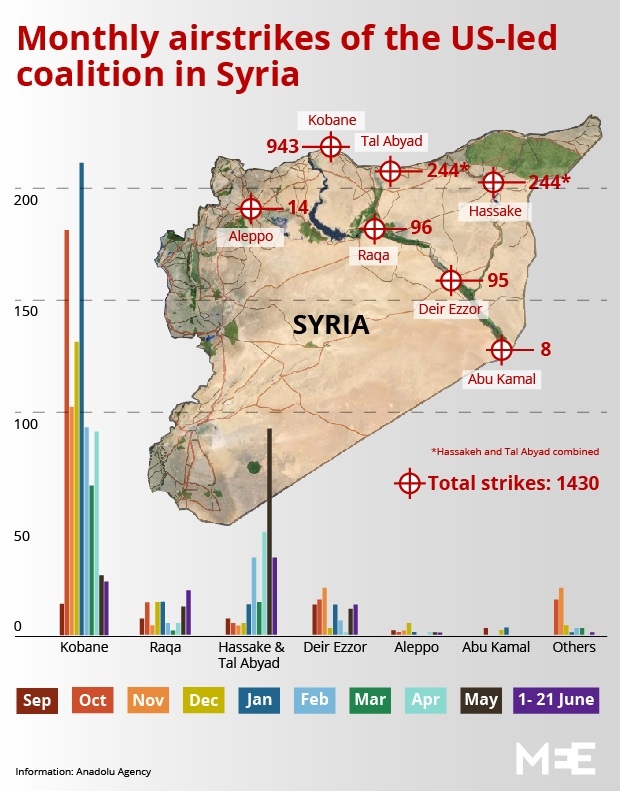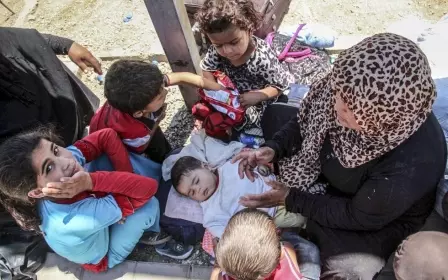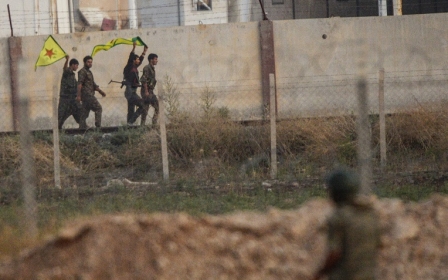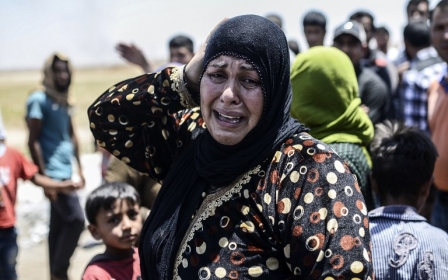Syrian Kurds make further advances helping to link cantons
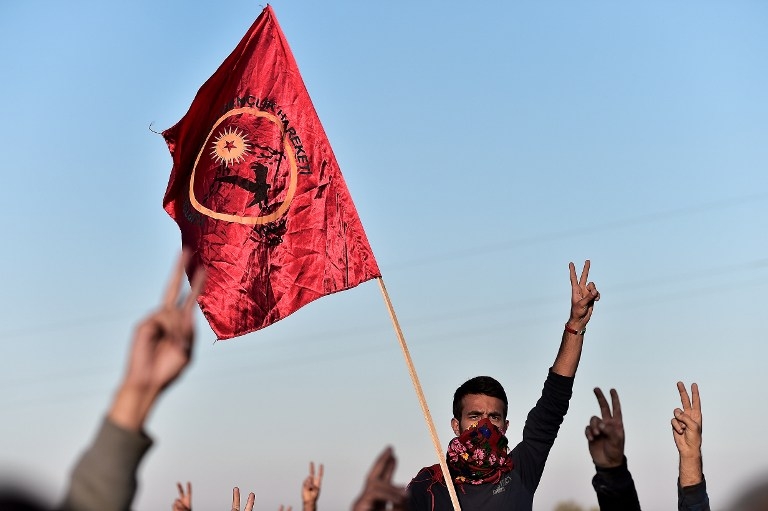
Syrian Kurds and allied rebel forces made further advances against the Islamic State on Tuesday, capturing a strategic town a day after seizing a base from the militant group near their Raqqa bastion.
A spokesman for the Kurdish People's Protection Units (YPG) and a Britain-based monitor said anti-IS forces took Ain Issa after capturing the nearby Brigade 93 base late on Monday.
"Ain Issa has come under our full control, along with dozens of villages in the surrounding area," YPG spokesman Redur Khalil told AFP.
The Syrian Observatory for Human Rights, a Britain-based monitor, said IS had withdrawn from the town and YPG and rebel forces were now checking for mines laid by IS.
Ain Issa's fall comes after IS ceded control of the town of Tal Abyad, a strategically key border town, more than a week ago.
Ain Issa and Brigade 93 are around 55 kilometres (35 miles) north of Raqqa, de facto capital of IS's self-declared Islamic "caliphate" in Syria and Iraq. They both lie on a main highway between Kurdish-held territory in Aleppo province to the west and Hasakeh province to the east.
"Considering that Raqqa is a sort of capital of the 'caliphate,' it creates a lot of pressure on IS,” Mutlu Civiroglu, a Kurdish affairs analyst told AFP.
Kurdish cantons reconnected
The latest gains have seen the YPG and allied militias boot out IS from strategically key areas near the border, and have allowed the Kurds to re-connect two of their three self-declared cantons of Jazirah and Kobani in northern Syria. The eastern-most pocket under Kurdish control, known as the Afrin Canton just north of Aleppo, remains cordoned off by the Islamic State.
The advances have been backed by US-led anti-IS coalition airstrikes, which many analysts believe have helped to turn the tide at least in northern Syria.
Pentagon data on US-led coalition airstrikes in the country shows that of the nearly 1,800 strikes launched in Syria since last year, at least 1,200 have supported Kurdish forces,
According to data from the US Central Command, in the last 10 months the alliance has conducted a total of 4,624 airstrikes against IS targets. Of this, 2,850 have been inside Iraq while 1,774 have been in Syria. The US has conducted 3,596 of the strikes with 1,930 in Iraq and 1,666 in Syria.
The remaining airstrikes have been carried out by coalition partners Australia, Bahrain, Belgium, Canada, Denmark, France, Jordan, Netherlands, UK, Saudi Arabia and the United Arab Emirates.
The strikes targeting IS positions in Syria began in September, one month after similar action in Iraq took place and following weeks of debate in the US.
However, the Kurdish advance has stirred controversy with allegations of ethnic cleansing of Arab and Turkmen villages surfacing in recent weeks.
According to interviews with refugees conducted by Anadolu Agency, some 700 Syrian Turkmen have fled to Turkey since the YPG-allied militias took control of Tal Abyad and allegedly began threatening non-Kurdish villagers.
More than a dozen Syrian opposition groups have also released a statement accusing the PYD of ethnically cleansing and of wanting to set up a fully autonomous region or even a fully independent Kurdish state.
"YPG forces have implemented a new sectarian and ethnic cleansing campaign against Sunni Arabs and Turkmens under the cover of coalition airstrikes, which have contributed to bombardment, terrorising civilians and forcing them to flee their villages," the statement issued last week, said.
The US, which supports PYD under the pretext of fighting IS, has thus far avoided helping other Syrian opposition forces, the statement noted.
The US has never officially said that it supports the YPG, with any outright backing likely to anger coalition partner and NATO member Turkey.
The People Protection Units, known as the YPG, are the military wing of the Kurdish Democratic Union Party, the main Syrian Kurdish force. The party is seen as an extension of the Turkish Kurdistan Worker's Party (PKK) which is seen as a terrorist organisation in Turkey and many Western countries, although there have been growing attempts in Europe to have the terror label removed.
An unnamed Pentagon official told Turkish Anadolu Agency that the coalition had concentrated its efforts on the northern parts of Syria due to their desire to cut IS supply lines and choke the group inside Syria to prevent the militants and equipment from moving into Iraq.
As the Kurdish forces lined up in northeast Syria, they contributed to the strategy of cutting off the supply lines in the north, the official said.
However, he also noted the increasing visibility of the militant group's targets in Kurdish-controlled areas and Kurdish fighters’ willingness to battle IS saying that this contributed to the coalition's decision to intensify airstrikes in these areas.
Despite the controversy, the willingness to back the Kurds has been seen time and again.
During violent clashes between Kurdish groups and IS in Kobane between October 2014 and January 2015, the coalition conducted 639 airstrikes on the militant group.
After the predominantly Kurdish town was recaptured from IS, the coalition conducted more than 300 airstrikes around the town, ramping up the total number of airstrikes on Kobane to 943 since October.
Another Kurdish-controlled area where the coalition has conducted more than 250 airstrikes was the self-declared Jazirah Canton in northeastern Syria.
As Kurdish rebels moved west to connect their forces in the self-declared Jazirah and Kobani cantons the coalition has followed with intensive air support, a report by AA alleges.
The coalition has conducted 244 airstrikes on al-Hasakeh and Tel Abyad with more than half of the strikes carried out in the last three months.
US-led airstrikes also put pressure on Raqqa and the group’s stronghold of Deyr Zawr, south of the regions controlled by Kurdish forces.
The Syrian Observatory for Human Rights said on Tuesday that at least 2,896 people - mostly IS fighters - had been killed in coalition strikes in Syria since the air campaign began on 23 September 2014.
The toll included 2,628 IS members, mostly foreign fighters, as well as 105 fighters from IS's rival militant group the al-Nusra Front.
According to the Observatory, coalition strikes have also killed 162 civilians - 52 of them children - in Syria although the Pentagon has acknowledged just two civilian deaths in Syria.
Observatory head Rami Abdel Rahman said IS's defence lines had been "pushed back to the outskirts of Raqqa city".
YPG’s Khalil has declined to comment on where the anti-IS fighters would focus their attention next, but suggested an operation against Raqqa was unlikely soon.
"Raqqa is much further away, and well-defended, it would require significant forces and weapons," he said.
Kurdish analyst Civiroglu also said any offensive against Raqqa would require lengthy planning and additional weapons for the YPG and its allies, who would opt to consolidate their hold on Tal Abyad and surrounding areas.
More than 230,000 people have been killed in Syria’s four-and-a-half year civil war which has also forced millions to flee their homes.
Both government and opposition forces have been criticised for indiscriminate attacks that have killed civilians.
Stay informed with MEE's newsletters
Sign up to get the latest alerts, insights and analysis, starting with Turkey Unpacked
Middle East Eye delivers independent and unrivalled coverage and analysis of the Middle East, North Africa and beyond. To learn more about republishing this content and the associated fees, please fill out this form. More about MEE can be found here.


